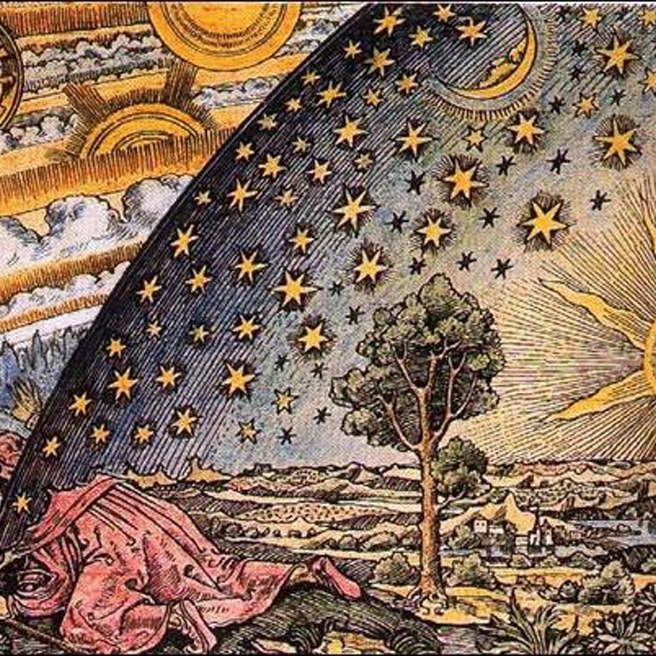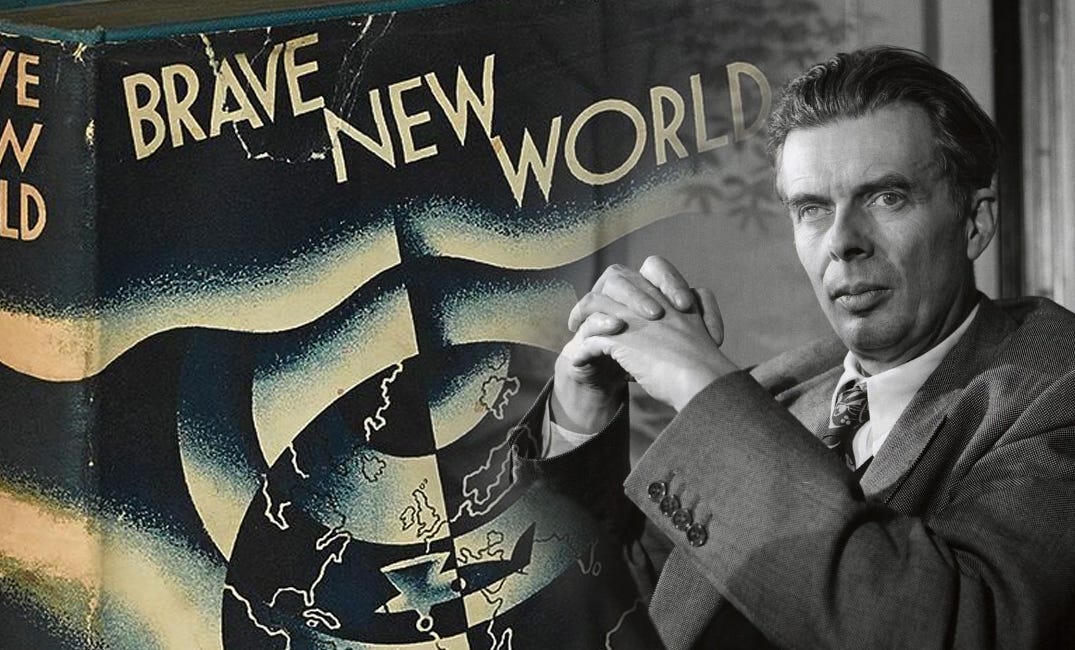This short essay was written in response to a reader, who like myself in our younger years, at first thought Aldous had written the character of John as a sort of hero figure, however, we now realise that that was not his intention, or at least, that this was an old hero archetype that Aldous wished to see destroyed. These are my thoughts on how I came to this conclusion.
The story of John (the Savage) is a clearly tragic one but is also a mocked one by Aldous. John is portrayed as someone who ultimately rejects "the nature" of things and is stuck in his overly rigid moral classical view of the world, represented primarily by his closeness to the works of Shakespeare. Thus, Aldous is also attacking what Shakespeare represents as well, in terms of a quality of moral intervention and reflection on a society that is regarded as sick, corrupt and mad. John is born in a Reservation, but his parents come from the “Utopia” world. The people living in this Reservation, the “natives” are all portrayed as monstrous human animals stuck in backwardness and blood-lustful traditions. John rejects the primitive immorality of his environment just as he later rejects the other extreme, the so-called advanced bio-technological environment of immorality he finds himself in within this Brave New World.
By the way, the title itself shows how Aldous mocks Shakespeare, since it is a line from Shakespeare's The Tempest, which is about seeking a better world, the New World, which was a hopeful concept of what the Americas would represent as an escape from the corruption and degeneracy of Europe at the time. Hence, the representation of John in the Reservation, can also be regarded as Aldous mocking the failed American experiment for a better world, out of the reach of European decay.
John, in his rejection of “the nature” of things, that is interpreted here as being governed by the seeking out of pleasure and the avoidance of pain, also rejects this bio-technological Utopia which also is primarily governed by the senses and the seeking of pleasure.
However, John himself finds that he also desires.
He becomes infatuated with Lenina, whom Aldous describes repeatedly as very “pneumatic.” However, in John’s desire for Lenina he is also portrayed as a hypocrite that cannot live up to the ideal he is demanding for. John in his desire for Lenina also rejects the promiscuous sexual nature of Lenina, he wants her to be a sort of Madonna, not a “whore”. He thus ultimately is disgusted by Lenina who does not live up to this moral standard. Lenina in fact finds this moral standard of a Madonna reprehensible, since she has been conditioned to think so, along with everyone else in this “Utopia.”
John, in his frustrations with Lenina, is a representation of the expectations of a rigid Christian dogmatic approach that is ultimately unrealistic in its expectations, and are portrayed as the very opposite of what is “natural”. We see this as well with John flagellating himself, in a desperate attempt to reject the desire for pleasure - he would rather seek out pain, something that he sees as free of immorality.
Lenina represents another extreme, which is the subject of maximum conditioning and biological engineering. Lenina does not really have thoughts of her own but is a creature that follows a hierarchical structure in society and ultimately does what she is told. In fact, Lenina herself, does not really want sexual promiscuity, but to not desire this is to be a dangerous heretic in her world. Ultimately Lenina is not too deeply troubled by this, a nice soma vacation and she is back to her normal self.
Mustapha Mond, one of the World Controllers, is in many ways how Aldous regards himself. It is a rather large irony that in this so-called world that is free to act out its sensual “natural” desires, it is not free to act out love, loyalty or purposefulness which are also, one can argue, “natural”. Mustapha Mond himself recalls how he had to make the decision as well, whether he would abandon purposefulness and real scientific inquiry for a status quo. For if indeed this world were in fact the best of all possible worlds we could hope for, change would be the ultimate enemy, at least through the lens of a World Controller.
Mustapha Mond decides to uphold the status quo, and to uphold this, certain “natural” tendencies must in fact be oppressed, re-engineered, forbidden. The only two characters that seem to be capable of “free will” are Mustapha and John (the others have gone through heavy bio-engineering and conditioning).
In the end, it appears according to Aldous’ portrayal, that Mustapha Mond made the better decision. But his decision is to give up entirely on his free will and make himself the abiding subject of a greater power, for clearly it was not Mustapha who thought up this world they live in. Mustapha decides to surrender to it and become its servant.
John is driven mad in his complete rejection of this world. Driven to a frenzy he is unable to change things or even influence things for the better. He can only preach from his book “The Works of Shakespeare.” In the end, John is driven to the state of a deranged animal, he has become a “savage” or perhaps Aldous would like us to believe that he always was one. He cannot cope with the realities of the world he lives in since he has been conditioned himself, he has brainwashed himself with the Christian traditions of Shakespeare and has been living in a delusion that cannot participate in any form of reality.
Thus, it is John who is a backwards primitive in this sense. The “Savage” is not the primitive “natives” living on the Reservation but the Old Christian World. As Aldous had one of the characters state, “soma is Christianity without tears.” It is Christianity that is portrayed here as the ultimate backwardness.
As Aldous paints the situation, there is no way out for John but to end himself, which he does and even in this last scene where we are given the image of his feet swaying to and fro from his hanged body, Aldous subtly mocks him to the very end.
It must be understood that Aldous himself, along with his brother Julian went through heavy conditioning. Eton was the first and probably most brutal experience for the three brothers. [In fact, George Orwell, the author of the dystopic novel ‘1984,’ attended Eton as well during the same time as the Huxleys. It is interesting that the two, arguably most famous dystopic novels of the 20th century, were written by individuals that had been conditioned in the same environment.] Aldous’ middle brother Noel (Aldous is the youngest and Julian the oldest) committed suicide on the family house grounds in his twenties, his body was not found until weeks later (the grounds were rather large). Aldous would lose a great deal of his sight at a young age and thus much of the larger expectations fell on Julian the oldest. Julian also suffered from a great deal of spiritual turmoil and underwent electro-shock therapy several times, including during the London bombings and had to be rushed into another building during an actual session of electro-shock. I think suffice to say, Aldous did not choose his life but it very forcefully chose him. The world that Aldous describes in his Brave New World, was already very much something that he had been living through, conditioned to and forced to adhere to in order to merely “survive” or at least one can see this was how Aldous saw things at a young age. It was a painfully unnatural process at first, but he came to not only accept it but enforce it in his own ways, in perhaps what he saw as a sympathetic acquiescence similar to a Mustapha Mond. Aldous surrendered to it and became its servant.
For Aldous there was no alternative to existence and one need to either accept this in order to have some modicum of “thriving” or else be destroyed in a pathetic attempt to oppose it. In the end, Aldous could not see what use there was in attempting to oppose such a massive apparatus already largely in place towards a scientific dictatorship. The only modicum of freedom granted in such a world, as understood by Aldous, was to become an enforcer of it, a World Controller. Hence his encouragement during his numerous lectures at such “elite” educational centers such as Berkeley to strive to be an Alpha, Alpha+ or if someone really played their cards right a World Controller. Only then could one have a little space of their own, a little piece of freedom, all they needed to do was completely surrender to it….
Thus, the true tragedy is that of Aldous himself in his story and mockery of a moral and loving idea of a Brave New World.
Cynthia Chung is the President of the Rising Tide Foundation and author of the books “The Shaping of a World Religion” & “The Empire on Which the Black Sun Never Set,” consider supporting her work by making a donation and subscribing to her substack page Through A Glass Darkly.
Also watch for free our RTF Docu-Series “Escaping Calypso’s Island: A Journey Out of Our Green Delusion” and our CP Docu-Series “The Hidden Hand Behind UFOs”.








Splendid!
I have thought much recently about the brief debate that Orwell and Huxley had during the second half of 1949, just a few months before Orwell’s death. They admired each others work, but Huxley wrote to Orwell telling him that his dystopian vision was, in essence, ‘too much work’, that brutal totalitarian dictatorships are simply not sustainable but they collapse in on themselves. They consume too much energy. When I heard Yuval Noah Harari say that his view of the proletariat, ultimately the useless eaters that do not contribute to society because they can’t(his view), was that the only solution was to keep them occupied “with drugs and computer games”.Pure Huxley there. It would appear that our modern and largely unavailable(as opposed to invisible) overlords share Huxley’s worldview. The Great Reset is a Huxleyan transformation, at least it is an attempt at it. But we know that Orwellian tactics are still part of the toolbox, and can and will be used as necessary.
Cynthia we have all in our younger years and through life fall for sophistry it's path of life and the process of learning... well in my opinion. The beauty of having others to re-calibrate our compass a blessing. Not sure about others but for me I see it as standing corrected takes humility and broaden the vision of path and direction?! Thank you for another re-calibrator!